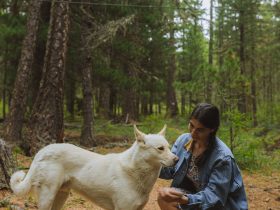WESTIE WEST HIGHLAND WHITE TERRIER PUPPIES AND DOGS
FAST FACTS
- Nickname: Westie
- Breed Group: Terrier
- Height: 10-11 inches
- Weight: 15-20 lbs
- Life Span: 12-16 years
WESTIE, WEST HIGHLAND WHITE TERRIER INFORMATION
WESTIE, WEST HIGHLAND WHITE TERRIER BASICS
WHERE ARE WESTIES FROM?
The history of West Highland White Terriers is quite dismal. In the late 1800s, Scottish landowner Colonel E.D. Malcolm mistakenly shot his Cairn terrier while out fox-hunting because he thought it was a rabbit. He vowed never to make another catastrophic error like that and to exclusively breed and hunt with extremely noticeable white Terriers from that point forward. This new breed of dog, the West Highland white terrier, started showing up at dog exhibitions in just a few decades.
HOW MANY TYPES OF WESTIES ARE THERE?
There is just one kind of West Highland white terrier, except for minor colour variations. Westies may resemble the Cairn terrier, the Dandie Dinmont, the Skye terrier, and the Scottish terrier.
WHICH BREEDS MIX WITH WESTIES?
- Wauzer (Westie + Miniature Schnauzer)
- Weeranian (Westie + Pomeranian)
- Wee-Chon (Westie + Bichon Frise)
- Weshi (Westie + Shih Tzu)
WESTIE, WEST HIGHLAND WHITE TERRIER LIFESPAN
Westies have a lifespan of around 12-16 years.
WESTIE, WEST HIGHLAND WHITE TERRIER SIZE (HEIGHT & WEIGHT)
Westies are little dogs averaging 15 to 20 pounds and around 10 to 11 inches tall.
WESTIE, WEST HIGHLAND WHITE TERRIER APPEARANCE
WHAT COLORS DO WESTIES COME IN?
Because of their Cairn forebears, Westies have a variety of colours of white, ranging from a dazzling bleached white to a white with a yellow tint.
HOW MUCH DO WESTIES SHED?
In addition to having minimal shedding, West Highland White Terriers also have very little dander. Although they are not specifically hypoallergenic, they are near.
DO YOU NEED TO GROOM A WESTIE, WEST HIGHLAND WHITE TERRIER?
Westies require frequent washes, frequent brushings, and the occasional haircut because of their white coats’ propensity to become pretty filthy quickly.
WESTIE, WEST HIGHLAND WHITE TERRIER TEMPERAMENT, PERSONALITY & TRAINING
HOW MUCH DO WESTIES BARK?
Westies like shooing away intruders and defending their families with their incisive voices. With the proper training and exercise, you can get any dog to stop barking as often.
ARE WESTIES GOOD WITH KIDS?
Terriers are not the best dogs for families with young children because of their potentially unpredictable behaviour. However, every dog is different, so as long as the dog is introduced to the kid at a young age and is well socialized, everything should be OK! Despite their tiny size, they are formidable creatures like romping and playing with kids.
As with any breed, it is advised that your youngster always is under adult supervision when interacting with your Westie to keep everyone safe.
ARE WESTIES GOOD FAMILY DOGS?
Westies are becoming more and more popular as household dogs. They are lively, authoritarian, pleasant, and playful. They love to protect their loved ones and are committed, family members. They would work best with a lively household that wants to show their dog affection and companionship.
ARE WESTIES GOOD WITH CATS?
Westies are reported to get along pretty well with cats despite having a high hunting drive. Of course, each dog (and cat) has unique preferences and temperaments, but you may be very sure that your Westie and cat will get along well if they are appropriately socialized or introduced at an early age.
ARE WESTIES EASY TO TRAIN?
West Highland White Terriers are blessed with excellent intellect, almost limitless tenacity, and a happy disposition, making them simple to teach.
WESTIE, WEST HIGHLAND WHITE TERRIER HEALTH
DO WESTIES HAVE A LOT OF HEALTH PROBLEMS?
Westies are a rather sturdy breed with a reasonably long lifespan.

WHAT DISEASES ARE WESTIES PRONE TO?
- Legg-Calve-Perthes: This illness results in the femur’s head, found in the dog’s rear limb, degenerating on its own. This will eventually cause arthritis and hip joint degradation. A Westie with Legg-Calve-Perthes will develop lameness, walk with a limp, and exhibit discomfort in the hip joint. The disease is most effectively treated by surgery.
- Pulmonary Fibrosis: The lung and its connective tissue are affected chronically and progressively by pulmonary fibrosis, commonly known as Westie lung disease. As a result, the lungs stiffen and thicken, making it difficult for oxygen to enter the circulation regularly. Chronic respiratory system damage from illnesses including pneumonia, congestive heart failure, and chronic bronchitis can develop into pulmonary fibrosis, although there is no recognized reason in other cases. The condition does seem to have a hereditary component on the lookout for decreased appetite, lack of energy, fast breathing, a cough, and shortness of breath. During routine checks, veterinarians sometimes hear a loud “cracking” in the lungs. The disease of pulmonary fibrosis is progressive and has no known treatment.
- Portosystemic Liver Shunt: The inherited condition known as portosystemic shunt (PSS) prevents the liver from receiving proper blood flow. PSS transfers the toxins in unfiltered blood to the heart, brain, and other bodily components since the liver are in charge of cleansing the body. These are just a few examples of signs of behaviour changes, appetite loss, hypoglycemia (low blood sugar), jaundice, issues with the urinary tract, eyesight issues, and stunted development. If PSS is not treated right away, it might be fatal. Surgery is the only long-term solution to the problem; antibiotics and dietary modifications can assist temporarily.
- Craniomandibular Osteopathy: The reason is unclear, but it is thought to be inherited. Though it is highly uncomfortable and can create feeding challenges, most pups grow out of it once they reach adulthood. This abnormal jaw development sometimes called “Westie jaw”, can make it difficult for a puppy to swallow or chew food.
- Others: Kneecaps can get dislodged due to patellar luxation; dry eyes; cataracts, a frequent eye disorder that obscures the sight and impairs vision; abdominal hernias; and “White Dog Shaker Syndrome,” a hereditary condition that produces tremors that continue for days, weeks, or the remainder of a person’s life.
PURCHASING VS ADOPTING A WESTIE, WEST HIGHLAND WHITE TERRIER
HOW MUCH DOES A WESTIE, WEST HIGHLAND WHITE TERRIER COST?
A West Highland white terrier can be adopted for much less than one would pay to purchase one. To cover the costs of caring for the dog before adoption, Westies cost about $300 to adopt. Contrarily, purchasing a Westie from a breeder may be unaffordable. Depending on their breeding, they typically cost between $1,000 and $1,500.
WHERE CAN I ADOPT A WESTIE, WEST HIGHLAND WHITE TERRIER
A rescue specializing in Westies would be the most straightforward place to find a home for a Westie or West Highland white terrier.
WESTIE, WEST HIGHLAND WHITE TERRIER SHELTERS AND RESCUES
Westie, or West Highland white terrier, pups are the focus of several animal shelters and rescue organizations that specialize in finding their beautiful homes.

WHERE CAN I FIND A WESTIE, WEST HIGHLAND WHITE TERRIER BREEDER?
Before you purchase a puppy from a breeder, we advise you to rescue a Westie, West Highland white terrier, or any other dog. In need of homes are the millions of purebred dogs who are homeless around the nation. Adopting a Westie or West Highland white terrier may change both the adopter’s and the dog’s life.
It is safer to get a puppy from a respected breeder if you still have doubts and want to buy a Westie or West Highland white terrier from a breeder. When working with a breeder, be sure that the breeder you’re buying from genetically tests their animals. You should also double-check the puppy’s health records. Finally, ensure the breeder will return any animals they sell if they cannot keep them in their home for whatever reason. Confirm they are dedicated to finding those animals’ new homes if necessary.






